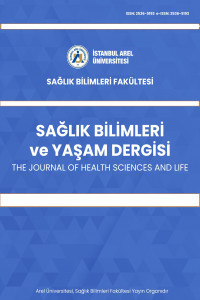KRANİOSAKRAL TERAPİ
Kraniosakral terapi; kas-iskelet sistemi problemleri, bilişsel ve duygusal problemler, üriner sistem
problemleri, mide-bağırsak problemleri, astım, çocuklarda görülen çeşitli engel durumları gibi farklı
birçok klinik durumda kullanılan tamamlayıcı bir tedavi yöntemidir. Semptomların ve ağrının azaltılması,
akciğer kapasitesinin arttırılması, genel iyilik halinin sağlanması gibi yararları bulunmaktadır.
Bu alandaki çalışmalar genellikle küçük örneklem gruplarında yapılmış olup kanıt düzeyi yüksek az
sayıda çalışma vardır. Ayrıca ülkemizde az sayıda uygulayıcısının olmasından dolayı araştırmaya açık
bir alandır. Bu konuda gerekli eğitimler alınarak ve daha geniş örneklem grupları kullanılarak daha
kapsamlı çalışmaların yapılması gerektiği düşünülmektedir.
Anahtar Kelimeler:
Kraniosakral terapi, tamamlayıcı tıp, manuel terapi
CRANIOSACRAL THERAPY
Craniosacral therapy is a complementary treatment method used in different clinical conditions like musculoskeletal
system problems, cognitive and emotional problems, urinary system problems, gastrointestinal
problems, asthma and various handicaps in children. It has benefits such as reducing symptoms and
pain, increasing lung capacity, and maintaining general well being. Researches in this field are usually
performed in small sample groups and there are few studies with a high level of evidence. It is also a field
open to research because of the small number of practitioners in our country. It is considered that more
extensive studies should be done by taking the necessary trainings and using wider sample groups.
Keywords:
Craniosacral therapy, complementary medicine, manual therapy,
___
- 1- Arnadottır, T. S. & Sigurdardottır, A. K, ” Is craniosacral therapy effective for migraine? Tested with HIT-6 Questionnaire”, Complementary Therapies in Clinical Practise, 19(1), 11-14, 2013
- 2- Astin, J.A., “Why Patients Use Alternative Medicine:Results of a National Study”, JAMA, 279 (19), 1548-1553, 1998
- 3- Braugh, N., Lindenmeyer, A., Thistlethwaite, J., Lewith, G. & Stewart- Browns, S., “Perspectives on the effects and mechanisms of craniosacral therapy: A qualitative study of users’ views” , European Journal of Integrative Medicine, 7(2), 172-183, 2015
- 4- Haller, H., Ostermann, T., Lauche, R., Cramer, H. & Dobos, G., “Credibility of a comparative sham control intervention for Craniosacral Therapy in patients with chronic neck pain”, Complementary therapies in medicine, 22(6), 1053-1059, 2014
- 5- Hanten, W. P., Dawson, D. D., Iwata, M., Seiden, M., Whitten, F. G., & Zink, T.,“Craniosacral rhythm: reliability and relationships with cardiac and respiratory rates”, Journal of Orthopaedic & Sports Physical Therapy, 27(3), 213-218, 1998
- 6- HIT-6 Headache Impact Test.http://neurohealth.info/wp-content/uploads/2010/10/hit6.pdf, 10/12/2017
- 7- Jakel, A. & Hauenschild, P., “A systematic review to evaluate the clinical benefits of craniosacral therapy ”, Complementary therapies in medicine, 20(6), 456-465, 2012
- 8- Kern M: Wisdom in the Body: The Craniosacral Approach to Essential Health.,Revised edition , 6-18, North Atlantic Books, U.S, 2005
- 9- Liem T: Cranial Osteopathy: Principles and Practice., Second edition, 8, 657-663, Churchill Livingstone, German, 2004
- 10- Upledger J.E., Craniosacral Therapy, Seminars in Integrative Medıcıne, 2(4), 159-166, 2004
- ISSN: 2536-5193
- Yayın Aralığı: Yılda 2 Sayı
- Yayıncı: İstanbul Arel Üniversitesi
